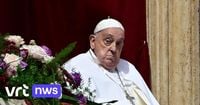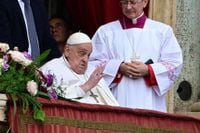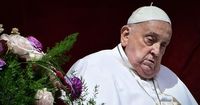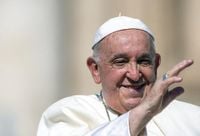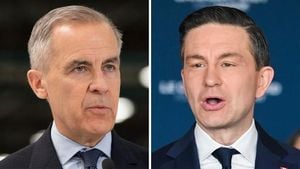Pope Francis, the first Jesuit and the first pope from South America, has passed away at the age of 88, as confirmed by the Vatican. His death marks the end of a twelve-year papacy characterized by a commitment to social justice and a focus on the marginalized.
Cardinal Kevin Farrell announced the death in a video message from the Vatican, stating, "The Bishop of Rome has returned to the house of the Father this morning, April 21, 2025, at 7:35 AM." This announcement came just a day after Pope Francis made a public appearance on Easter Sunday, April 20, 2025, where he addressed the faithful from the balcony of St. Peter's Basilica, albeit with a noticeably weakened voice.
The pope's health had been a concern in recent months, as he was recovering from double pneumonia. Despite his frailty, he had a brief meeting with U.S. Vice President J.D. Vance on the same day, who remarked on social media, "I was glad to see him yesterday, even though he was clearly very sick. My heart goes out to the millions of Christians around the world who loved him." Vance's visit was likely one of the last official engagements for the pontiff.
Pope Francis's passing has elicited an outpouring of grief and tributes from leaders around the world. French President Emmanuel Macron called him a "humble man, who stood by the most vulnerable and fragile." Meanwhile, Italian Prime Minister Giorgia Meloni expressed her sorrow, stating, "The news of the pope's death makes us very sad, for he was a great man and a great shepherd." Meloni noted that his teachings and legacy would not be lost.
As news of his death spread, many remembered the socially conscious Jesuit's efforts to reform the Catholic Church and advocate for the poor. Maxime Prévot, Belgium's Minister of Foreign Affairs, praised him as a "reformer who was constantly engaged with issues of social and climate justice," emphasizing that he embodied hope for Christian communities and beyond.
However, the death has also raised concerns among victims of sexual abuse within the Church. Koen Van Summeren, a Belgian victim who had met with the pope, stated, "His death is not good news for us," referring to a planned follow-up meeting that was intended to press for action against the slow progress in addressing abuse cases in Belgium. Van Summeren described the pope as a kind and humble leader, contrasting his approach with that of previous Church figures.
The former Bishop of Ghent, Luc Van Looy, shared his own reflections, noting that he had seen Pope Francis during the Easter celebration and had sensed that something was wrong. "I thought, 'this is not good,'" he recalled, pointing to the pope's frail voice. Van Looy highlighted the significant reforms that the pope had initiated, particularly in terms of gender roles within the Church, stating, "He has worked hard on the renewal of the Church, bringing about changes in situations that were not easy."
As the Vatican prepares for the funeral and subsequent selection of a new pope, protocols are being set into motion. The camerlengo, Cardinal Kevin Farrell, will ceremonially declare the pope dead and oversee the arrangements for the body, which will be embalmed and laid in state in the Sistine Chapel. Traditionally, the funeral occurs between the fourth and sixth day after the pope's death, with Pope Francis having expressed a desire for a simpler ceremony compared to his predecessors.
Following the funeral, a conclave will be convened, with all cardinals gathering to elect the new pope. This process begins no sooner than fifteen days after the passing, culminating in the iconic moment when white smoke signals the election of a new pontiff.
Pope Francis's legacy is likely to be a topic of significant discussion in the coming days. Many will reflect on his commitment to addressing pressing global issues such as poverty, climate change, and the need for inclusivity within the Church. His approach to leadership was often described as one of humility and connection to everyday people, a stark contrast to the more traditional and hierarchical leadership styles of his predecessors.
As the world mourns the loss of this transformative leader, it is clear that Pope Francis's impact on the Catholic Church and global society will be felt for years to come. His efforts to bridge divides and advocate for the marginalized have left an indelible mark on the hearts of many, and his teachings will continue to inspire future generations.
In the wake of his death, the Catholic community and the world at large are left to ponder the future of the Church and the direction it will take under new leadership. The challenges facing the institution remain significant, but Pope Francis's legacy of compassion and reform will undoubtedly serve as a guiding light for those who follow in his footsteps.
